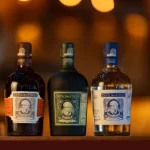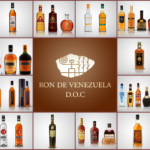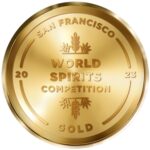Venezuelan Rum: An Evolution of Flavor and Culture
Rum, that iconic distilled beverage that has delighted palates around the world, has deep roots in the history and culture of Venezuela. Over the years, Venezuelan rum has evolved from its humble beginnings to become one of the most respected and valued spirits globally. This educational and informative article will delve into the rich history of rum in Venezuela, from its origins to its international recognition.
The Early Steps in Rum Production
The exact origin of rum is debated, but it is believed to have originated in the West Indies, specifically in the Caribbean. Sugarcane, an abundant plant in the region, became the primary raw material for crafting this alcoholic beverage. As sugarcane spread throughout the Americas, so did the art of distillation and fermentation.
The Revolution of the Organic Law on Liquor Revenue
The most significant change in the history of Venezuelan rum occurred in 1954 with the enactment of the Organic Law on Liquor Revenue during the presidency of General Marcos Pérez Jiménez. This law stipulated that, in order to be called “rum,” the distilled spirit had to be aged for a minimum of two years. Although presented as a regulation to enhance quality, this law was influenced by political and business interests.
At that time, Ron Santa Teresa controlled over 80% of the liquor market in Venezuela. Rum production lacked regulation, and companies were not obliged to age their products. This changed when companies like Cacique and Pampero, facing economic difficulties due to low sales, began accumulating inventories. Alejandro Hernández, the president of Industrias Pampero, championed the law, which changed the rules by requiring a minimum two-year aging period for a spirit to be considered rum.
The Effects of the Law on the Rum Industry
This law had a profound impact on the Venezuelan rum industry. Due to Ron Santa Teresa’s high product turnover, they had little inventory of two-year-aged rum, which affected their short-term operations. On the other hand, Cacique and Pampero, with inventories exceeding two years, benefited from this regulation. Over time, the market balanced out, allowing Ron Santa Teresa to regain its leading position, while other brands also experienced growth.
Natural and Cultural Factors Defining Venezuelan Rum
Beyond political and business influences, natural and cultural factors have contributed to the renown of Venezuelan rum. Venezuela’s climatic conditions and temperature variations between day and night create optimal conditions for aging in oak barrels. This process allows for the exchange between alcohol and wood, imparting rum with its distinctive color, aroma, and flavor.
Furthermore, the Denomination of Controlled Origin (D.O.C.) established in 2003 by the Autonomous Service of Intellectual Property (SAPI) has reinforced the quality and authenticity of Venezuelan rum. This certification attributes characteristics and exclusivity to rums produced in Venezuela, emphasizing the significance of geographic location in the creation of this spirited beverage.
International Recognition and Celebration of Venezuelan Rum
The exceptional quality and flavor of Venezuelan rum have not gone unnoticed on the international stage. Venezuelan rum has been recognized at numerous fairs and liquor competitions. Its distinctive flavor profile and carefully regulated production process have contributed to its esteemed position within the global liquor industry.
August 16th holds special significance in the Venezuelan and Latin American calendars as the International Day of Rum. This date emphasizes the cultural significance and craftsmanship involved in making rum, thanks to brands like Ron Diplomático. Additionally, various celebrations and events throughout the year underline its deep-seated influence on Venezuelan culture and heritage.
The Most Important Rum Brands
In Venezuela, there are several rum brands that are recognized both nationally and internationally for their distinctive quality and flavor. Some of the most important and prominent brands in the Venezuelan rum industry are as follows:
1. Santa Teresa: One of the most emblematic Venezuelan rum brands, Santa Teresa has been a presence in the industry for decades. Known for its high quality and meticulously controlled production process, this brand has managed to establish itself on the international rum scene.
2. Diplomático: Another globally renowned brand, Ron Diplomático, has become synonymous with premium rums. They offer a variety of expressions that encompass different aging levels and flavor profiles, contributing to their recognition worldwide.
3. Cacique: Founded in 1959, Cacique is another iconic brand in Venezuela. Its rum is appreciated for its smoothness and characteristic flavor. Over the years, Cacique has managed to maintain its position in the market, both nationally and internationally.
4. Pampero: With a history dating back to the mid-20th century, Pampero is a brand recognized for its commitment to quality and tradition. Its aged rum has captured palates around the world and has been awarded in various competitions.
5. Carúpano: Founded in 1762, Destilería Carúpano is one of the oldest distilleries in Latin America. Their rums stand out for their artisanal production process and focus on excellence. They have gained recognition for their unique and distinctive flavor profile.
6. Ocumare: Known for its high-end and aged rum, Ron Ocumare is a brand that has gained prestige both within and outside of Venezuela. Their commitment to quality and tradition has been a pillar of their success.
7. Roble Viejo: This brand stands out for its focus on artisanal production and attention to detail at every stage of the process. Their rums are valued for their authentic character and flavor.
8. Veroes: Highlighting the importance of its designation of origin, Ron Veroes has endeavored to preserve the authenticity of Venezuelan rum. Their commitment to quality and tradition is reflected in their products.
9. Estelar: This brand has strived to create high-quality rums that represent excellence and Venezuelan culture. Its presence in the market has grown thanks to its focus on quality and innovation.
These are just some of the most important brands in the rum industry in Venezuela. Each of them has its own approach, history, and unique flavor profile, contributing to the diversity and richness of Venezuelan rum on the global stage.
Conclusion
The history of Venezuelan rum is a captivating journey of legislative changes, commercial rivalries, and natural elements converging to shape one of the world’s most cherished beverages. From its origins on sugarcane plantations to its current status as a cultural icon and renowned export, Venezuelan rum stands as a testament to humanity’s ability to transform simple elements into liquid masterpieces. The interplay of historical, cultural, and geographical factors has forged the distinctive character of Venezuelan rum and secured its place in the global history of alcoholic beverages.
Featured image: Connor Home / Unsplash
About The Author
Camilo is an audiovisual communicator with over 15 years of experience. He resides in Caracas, Venezuela, and has studied film and television, acquiring skills in writing film scripts. He currently works as a Digital Content Manager at TRL. If you would like to see his portfolio, you can visit his website at http://ccesarino.com.





